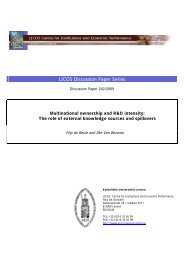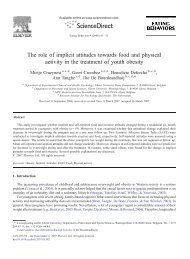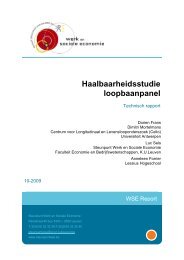View/Open - Lirias@Lessius
View/Open - Lirias@Lessius
View/Open - Lirias@Lessius
You also want an ePaper? Increase the reach of your titles
YUMPU automatically turns print PDFs into web optimized ePapers that Google loves.
Cyprus: The Belgian ‘Tool Box’ Revisited<br />
on this count. What is needed in a federal, multi-ethnic or multi-linguistic state, is<br />
the permanent will to communicate with each other, to transcend prejudices, and<br />
to cooperate in every field. This applies to Belgium, but also to Cyprus, should the<br />
island one day become a federal state.<br />
So, what is it that can transform the Cyprus quagmire, bearing in mind that<br />
the continued oppression of the Turkish Cypriot people either through pressure<br />
or “peace pushing” will not bring sustainable peace and stability to the Island or<br />
to the region?<br />
The ICG report of March 8, 2006 concludes that “the idea that Turkish Cypriots<br />
will… accept minority status in a centralized Greek Cypriot state is a pipe<br />
dream” 17 If the international community does not want the Turkish Cypriots to<br />
opt for the Kosovo route, the Greek Cypriot people need to be seriously incentivized<br />
as early as possible, towards a genuine power-sharing deal. As such, they<br />
must be convinced that they have more to gain from an equality-based partnership,<br />
even though, as a majority, they have natural benefits today. EU member<br />
Belgium could then be a valuable pool from which lessons can be drawn.<br />
EU membership could have been the “incentive” or catalyst but unfortunately<br />
the EU wasted its golden card by failing to apply the required conditionality,<br />
namely to resolve the Cyprus conflict before membership. Now, probably the only<br />
remaining effective catalyst that can move the Greek Cypriot side is the increasingly<br />
likely de facto recognition of the TRNC by the rest of the world, if the Greek<br />
Cypriot leadership continues to pursue a policy of continued isolation of North<br />
Cyprus and proves unwilling to bring forward a partnership settlement. 18<br />
As discussed earlier, multi tier partnership governance arrangements require<br />
certain prerequisites to be in place (overarching common need, common vision,<br />
interdependence, and respect for the equal status of the other partner, mutual<br />
trust, tolerance, and empathy, etc.) for its smooth functioning and sustenance.<br />
In their book chapter entitled “Power Sharing for Cyprus (again)? EU Accession<br />
and the Prospects for reunification,” Tozun Bahcheli and Sid Noel compare,<br />
among other things, the cases of Cyprus and Belgium. While they mention that<br />
this could be seen as a preferred outcome from the EU perspective, they note<br />
that there are some serious shortcomings in the “transfer of (complex) Belgian<br />
political institutions to Cyprus.” They highlight, for instance, that (1) Greek and<br />
Turkish leaders each prefer different aspects and applications of the Belgian<br />
model which they calculate would, if implemented, maximize the payoffs to their<br />
respective communities in future games; (2) Belgian federalism evolved under<br />
131
















